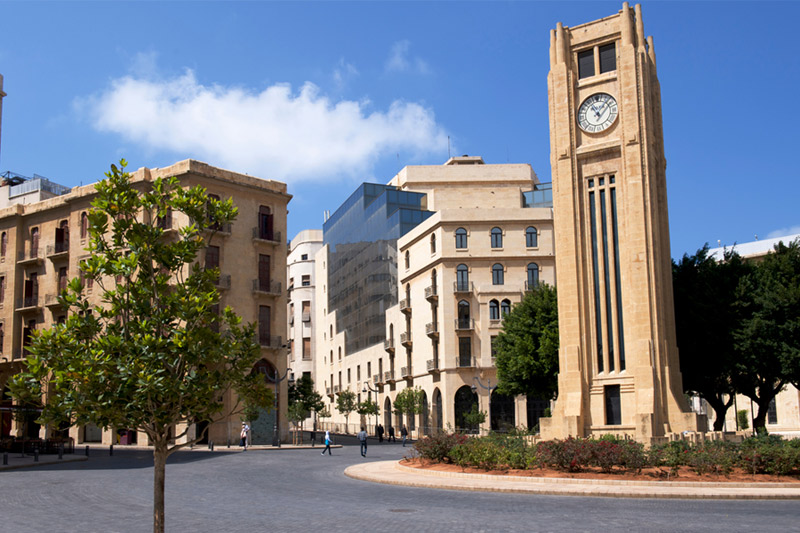(Bloomberg) -- Lebanese Prime Minister Saad Hariri gave his feuding coalition government a 72-hour deadline to get behind an economic overhaul program or he would step aside and let them deal with a financial crisis that has brought thousands of protesters onto the streets.
In an impassioned speech broadcast live on television, Hariri said political rivals inside the government were blocking steps that could unlock some $11 billion in international aid pledges.
“If anyone thinks they have another solution” they are welcome to take power and try to implement it, Hariri said.
The ultimatum did little to ease anger on the streets, where some of the biggest protests in years were into their second day. Amid chants of “revolution” and “the people want the fall of the regime,” demonstrators burned tires, blocked roads and converged on the government headquarters in Beirut demanding the resignation of an entire political class they blame for economic mismanagement and falling living standards.
The economic stakes have rarely been higher for Lebanon, a tiny country that straddles the geopolitical fault-lines of the Middle East, since the end of the 15-year civil war in 1990. One of the most indebted countries in the world, it is struggling to find fresh sources of funding as the foreign inflows on which it has traditionally relied have dried up.
Fractious Government
The protests have increased pressure on Hariri, who heads a fractious coalition government that has struggled to overcome sectarian and political differences.
A Sunni Muslim, Hariri has been traditionally backed by Saudi Arabia, but the kingdom has withheld support in recent years as the Iranian-backed Hezbollah militia’s political influence in the government has grown.
At the same time, Hezbollah-allied ministers and lawmakers have steadfastly opposed higher taxes and other difficult measures to spare their supporters further economic pain amid tightening U.S. sanctions on the group’s members and on its patron, Iran.
The crisis has catapulted Lebanon into a new and unpredictable phase. If Hariri and his allies resign, Lebanon could end up with a government dominated by Hezbollah, making it even harder to attract investment.
If it survives, few observers see how the government can overcome divisions that have already brought the economy to the precipice.
The International Monetary Fund projects Lebanon’s current-account deficit will reach almost 30% of gross domestic product by the end of this year. Amid the violence on Thursday, it issued a new report predicting that economic growth, stagnant at 0.3% in 2018, would continue to be weak amid political and economic uncertainty and a severe contraction in the real estate sector. Public debt is projected to increase to 155% of gross domestic product by the end of 2019, it said.
Persistent instability in Lebanon has shaken investor confidence and made it harder to revive an economy already struggling to absorb more than 1.5 million Syrian refugees who have fled the war in their country.
The yield on Lebanon’s dollar bonds due in 2021 jumped more than two percentage points to 20.38% as of 10:44 a.m. in London, snapping six days of declines. The cost of insuring Lebanese debt against default climbed, with the nation’s five-year credit-default swaps rising 87 basis points to 1,262 -- the highest level on a closing basis since the start of the month.
WhatsApp Calls
Sporadic demonstrations have erupted for months in Lebanon as the economic crisis has led to shortages of dollars and threatened the pensions of retired soldiers.
The latest unrest was sparked by plans to impose a fee of 20 U.S. cents on the first WhatsApp call that users make every day, causing outrage in a country where communications costs are among the least competitive in the region and people widely use internet voice applications to save money. WhatsApp, a free messaging and voice platform owned by Facebook Inc (NASDAQ:FB)., has some 1.5 billion users worldwide.
The government also discussed a proposal for a gradual increase to the value-added tax, currently at 11%, and new levies on gasoline. But Finance Minister Ali Hasan Khalil, who’s party is allied to Hezbollah, insisted there were no additional taxes planned for next year’s budget.
As night fell, scuffles once more broke out between protesters who tried to storm the government headquarters downtown, and riot police.
Walls of burning tires and debris effectively severed the main thoroughfares at the northern and southern entrances of Beirut, and crowds also headed toward the presidential palace in Baabda, footage aired on Lebanese television stations showed.
